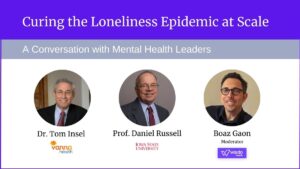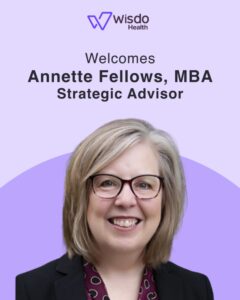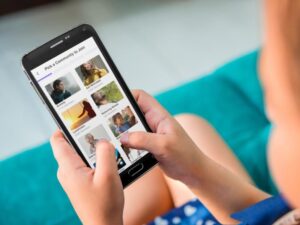The costs of loneliness are rising.
30% of Americans aged 65+, and 60% of Americans aged 18 to 65, are impacted by loneliness today. That’s 124M Americans, with an estimated increase of 5% each year. The negative impact of loneliness on physical and mental health leads to disastrous financial costs, estimated at $161B annually for Medicare Advantage plans and employers.*
In light of this, Wisdo Health convened a panel with three distinguished experts on September 14, 2022, to discuss a health care intervention that can effectively address loneliness at scale, while driving down medical costs.
Featured panelists were Dr. Tom Insel, Former Director of the National Institute of Mental Health & Co-founder of Vanna Health, and Professor Dan Russell, Co-developer of the UCLA-3 loneliness scale. The panel was moderated by Wisdo Health’s CEO and Founder, Boaz Gaon.
Loneliness and lack of engagement
Dr. Tom Insel, who recently authored Healing, kicked off the conversation by pointing out that, though social connection has long been established as a basic human need, our health care systems have made little advancement in addressing this need through quantifiable and qualifiable measures.
Clinical therapy has become the default intervention. However, as Dr. Insel stated, “our providers probably are feeling some satisfaction in helping the people they see, but they’re only dealing with 6- or 7% of the population in need.”
The result? As Dr. Insel puts it, “If you look at the US, especially at numbers around suicide, … both morbidity and mortality for people with mental illness, have not gone in the right direction.
We’ve done worse, not better since the turn of the century.”
While Dr. Insel does believe that stigma and lack of access are legitimate barriers to engagement with treatment, he points out that “the most overlooked and the most important issue around this lack of engagement is the illnesses themselves get in the way. If you’re depressed, you’re hopeless. If you’re anxious, you’re avoidant, so you’re not going to seek treatment. And honestly, if you’re psychotic, you don’t think you’re sick. So why would you be going for care?
“We have to figure out how to engage people who are not in care.” And how do we go about this? Later in the conversation, Dr. Insel pointed out that creating opportunities for these individuals to develop a sense of purpose will be one of the most effective ways to do so.
Dr. Insel also pointed out, “One of the most therapeutic interventions isn’t just getting people help, it’s empowering them to be able to give help to others…This ought to be what we consider as part of healthcare.”
The evolution of how loneliness is measured and defined
The conversation continued with Professor Dan Russell, co-developer of the UCLA-3 loneliness scale, which has become the standard tool for measuring loneliness.
Professor Russell’s study of Robert Weiss’ work from the early ‘70s, and subsequent findings with his own research on loneliness, led him to distill four provisions for reducing loneliness and improving social health: emotional support, reliable alliance, reassurance of worth, and social integration.
“It’s the lack of these different types of social support that is most strongly related to loneliness in our research,” stated Professor Russell.
What a health care solution for loneliness looks like
Considering the barriers to reducing loneliness, as well as the intricacies involved with attaining social health, the task to cure loneliness at scale is surely a challenging one.
It seems the most effective solution would be an intervention that incorporates the provisions of social health, provides a medium for suggesting available interventions that members may not be aware of, and provides “more preventative and rational care” as Dr. Insel put it, that would decrease reliance on an expensive, crisis-centered triage system that leaves out over 90% of the population in need.
One thing is certain: there still remains more to explore.
Click to view a recorded version of the webinar.
Be sure to join us for our upcoming webinar which will take place on October 26th, 2022 featuring Annette Fellows, VP of Health Products & Services at UnitedHealthcare, and Dr. Charlotte Yeh, Chief Medical Officer at AARP Services. The discussion will be moderated by Boaz Gaon, Wisdo Health’s, Founder and CEO.
About Wisdo
Wisdo is an award-winning social health and clinical referral platform that addresses the adverse consequences of social isolation and loneliness on the mental and physical health of 124 million Americans ages 17-80. We provide curated peer-to-peer connections, training to selected peers in how to offer emotional support and timely referrals to appropriate clinical services that reduce cost substantially.
Learn more at www.wisdo.com
*Holt-Lunstad, Robles, and Sbarra. 2017. ; National Academies of Sciences, Engineering, and Medicine. 2020. ; https://newsroom.cigna.com/loneliness-epidemic-persists-post-pandemic-look ; AARP, Cigna










